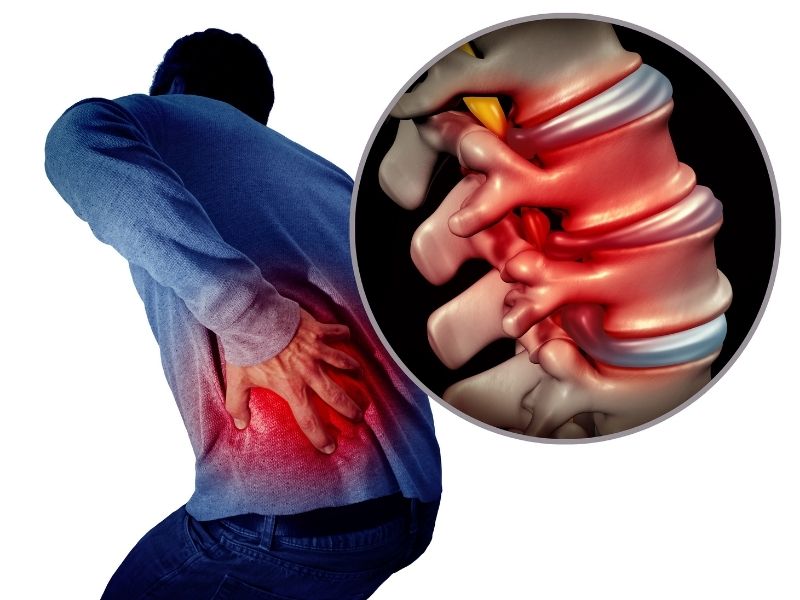A disc bulge, also referred to as a prolapsed bulged disc, or a slipped disc, can cause discomfort when you flex your back. This pain can be addressed with disc bulge physiotherapy treatment.

WHAT IS A DISC BULGE?
Our spine is made up of interlocking bones known as vertebrae and separating each of the vertebrae are discs. Discs are the shock absorbers of the spine and allow cushioning between vertebrae during movement.
The disc is made up of an outer layer of fibrous connective tissue which envelopes the inner gel-like centre of the disc. It is the inner gel like substance of the disc that is easily able to change shape which can lead to disc bulges. Once cracks form in the outer fibrous layer of the disc, the gel-like centre is able make its way through and results in a disc bulge. Once this occurs, it may be beneficial to look into a slipped disc treatment program.
WHAT CAUSES A DISC BULGE?
The result of continuous repetitive stress on the disc is most commonly the cause of a disc bulge. Activities which most commonly result in disc bulges are prolonged sitting, bending forward or lifting tasks.
All these positions result in flexion of the lumbar spine and if done for a long period of time, repeatedly or forcefully enough then a disc bulge can result.
Correct technique during such tasks to ensure you are placing the least amount of stress on the disc is often the starting point in disc bulge physiotherapy.
Current lumber spine research, and the correlation with MRI results, indicate disc bulges are more prominent than previously anticipated. The majority are asymptomatic until exacerbated. So, loading changes of the lumber spine is completely normal and can correlate to the respective age of the patient.


WHAT ARE THE SYMPTOMS OF DISC BULGE?
The pain is usually felt during the provocation activity such as bending, bending whilst twisting or picking up objects such as that cake of soap in the shower. Patients can at times complain of deep constant pain across the lower back.
The pain can increase in intensity with sudden movements like bending, twisting or getting in and out of the car. If the disc bulge is significant enough, patient will complain of the pain radiating down into the buttocks or the leg/s.
At that time patients do not need to have centralised lower back pain but radicular pain to the upper hamstring and distally from that. Patients will also usually talk about the pain and stiffness being worst in the morning and becomes less intense after 30 minutes of movement or a hot shower.
WHAT WILL DISC BULGE PHYSIOTHERAPY DO FOR MY PAIN?
Physiotherapy treatment is directed towards modifying movement patterns which lead to the overload on the disc in the first place. To start with, your physiotherapist will address restrictions in range of motion, joint movement deficits, muscle tightness or weakness and incorrect movement patterns.
Your Brisbane physiotherapist will utilise a range of manual therapy techniques such as soft tissue release, deload taping techniques, joint mobilisation/manipulation or dry needling therapy in treatment sessions. If necessary, you may also receive a targeted exercise program to address dysfunctions.

If you are experiencing pain while using your back, check out our blog on Prolapsed Bulged Discs or book an appointment with our friendly back injury rehab team.
Call our physio Brisbane experts today on 07 3352 5116 or book an appointment online.
Frequently Asked Disc Bulge Physiotherapy Questions
Is Physiotherapy Good for a Disc Bulge?
The pain levels associated with a bulging disc can be incredibly painful and disruptive to everyday activities. A slipped disc treatment program can help strengthen muscles, increase mobility and decrease pain. Get in touch with Pivotal Motion Physiotherapy for more details on 07 3352 5116.
Does a Disc Bulge Go Away?
Individual results will vary and depend on the extent of the injury. Frequently, however, a slipped disc will heal with proper care and treatment. Learn about all your options by discussing your choices with the experts at Pivotal Motion Physiotherapy. To make a booking, schedule online or call 07 3352 5116.

